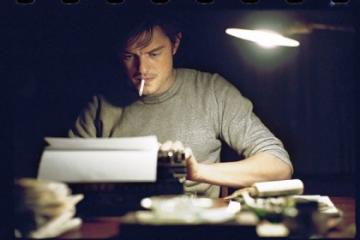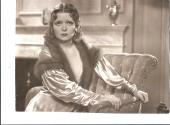Kerouac's `On the Road' takes a faithful trip from page to screen
Ponder this pontifical pronouncement: In the history of cinema, only three of a thousand great-books-on-film can be called perfect -- "Gone With the Wind," "Slaughterhouse Five" and "The Godfather."
We pity as well as admire the serious director who sets out to turn a literary landmark into a movie. Walter Salles is such a helmsman, Jack Kerouac's "On the Road" is such a book, and the resulting picture is not such a fourth miracle of perfection. But it's remarkably successful in the attempt.
Kerouac's 1957 Beat Generation classic is the coming-of-age, becoming-of-writer tale of Sal Paradise (Sam Riley). Sal's life and art are electrified by his wildly free-spirited pal Dean Moriarty (Garrett Hedlund) -- and Dean's girl Marylou (Kristen Stewart) -- during their booze-and-drug-fueled odyssey across
It took a brilliant Brazilian to finally film this quintessentially American story. Mr. Salles' terrific "Central Station" (1998) and Che Guevara biopic "Motorcycle Diaries" (2004) were his warm-up acts. Here, with Jose Rivera's thoughtful screenplay, he translates Kerouac's ultimate road trip into a road movie that alternates Benzedrine and be-bop with moody contemplative moments -- a rebellious pilgrims' progress from Sal's Ozone Park, N.J. [Queens?] home to Harlem's jazz clubs, to Denver and San Francisco and beyond, in perpetual-motion overindulgence.
"The only people for me are the mad ones," says Kerouac, through Sam, " -- the ones who are mad to live, mad to talk, mad to be saved, desirous of everything at the same time, the ones that never yawn or say a commonplace thing, but burn, burn, burn!"
Dean (the fictional version of Kerouac's real-life friend Neal Cassady) is Sam's incendiary instigator-inspiration. Marylou (the real-life LuAnne Henderson) is the used and abused object of their misogyny -- or a liberated woman ahead of her time? Either way, the three of them seize every moment to burn the candle at both ends and the middle, too, with 24/7 hedonism, stealing food and gas ("Like President Truman says, 'We have to cut down on the cost of living!' "), in the radical freedom of a revolution they don't really know or intend to make.
Mr. Riley -- a Leo DiCaprio lookalike -- is quite good as the ingenuous Sam. Ms. Stewart of "Twilight" fame (and striking debut in Sean Penn's "Into the Wild") is a perfect Marylou, kicking up her heels and the film's sex quotient in numerous hot two- and three-way love scenes. Nobody worried about STDs in those days: At one point, Sal and Dean take on the whole Best Little Whorehouse in
(Which reminds me to remind you not to take Aunt Thelmah to this movie.)
Kirsten Dunst is excellent as Dean's long-suffering wife, Camille, and Viggo Mortensen is superb as "Bull Lee" -- the real-life William S. Burroughs character. So is Tom Sturridge as "Carlo Marx" -- the Allen Ginsberg of the piece. "Are you being honest with me from the bottom of your soul?" he says, emerging ever more aggressively from his homosexual closet. Steve Buscemi does a wonderfully perverse cameo as a similarly inclined traveling salesman.
The problematic casting is of Mr. Hedlund as Dean, the chick magnet and sex machine. He has a million-dollar smile and he's an extremely hot dancer. On Kerouac's printed page, Dean can hardly speak fast enough to get his erotic stream-of-consciousness thoughts out. But Mr. Hedlund's laconic drawl lacks charisma. If you see the film without having read the book, you may wonder why Sal finds him so mesmerizing.
On the other hand, Gustavo Santaolalla's bongo-based musical punctuation is faultless, as is Eric Gautier's cinematography.
Kerouac's original manuscript was famously written not on separate pages but on one huge taped-together scroll -- a single paragraph, 120 feet long! -- and published only after many rejections and much censoring of its sex passages. The paradoxically Catholic, anti-Communist author, who died of alcoholism at 47, always wanted Marlon Brando to play Dean in the (hoped-for) film version.
This film version feels less exuberant than the book, slowed down and muted to emphasize the loneliness and melodramatic pain more than the wild excitements of the road. Still, it's a worthy rendering of its be-bop bohemian -- dissipated yet strangely innocent -- heroes. Serious and respectful.
A little too serious, a little too respectful.






